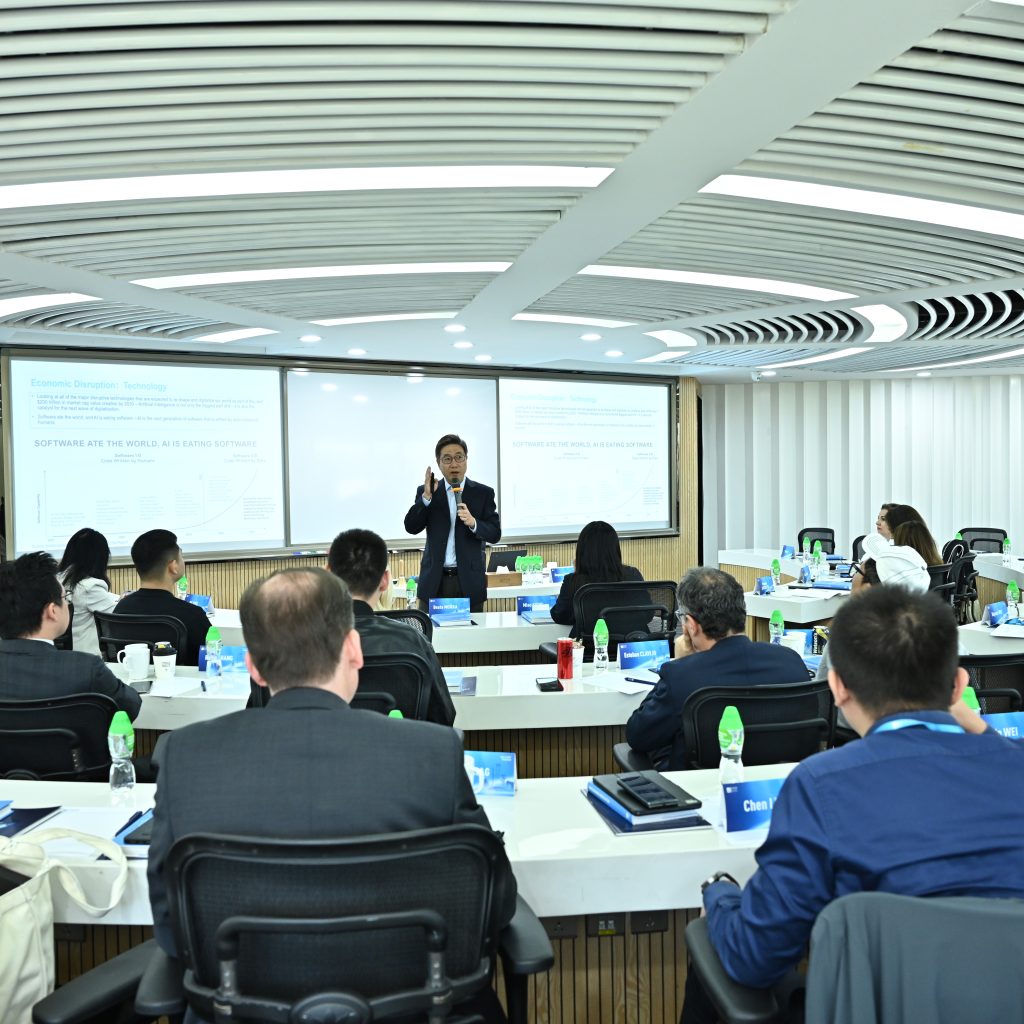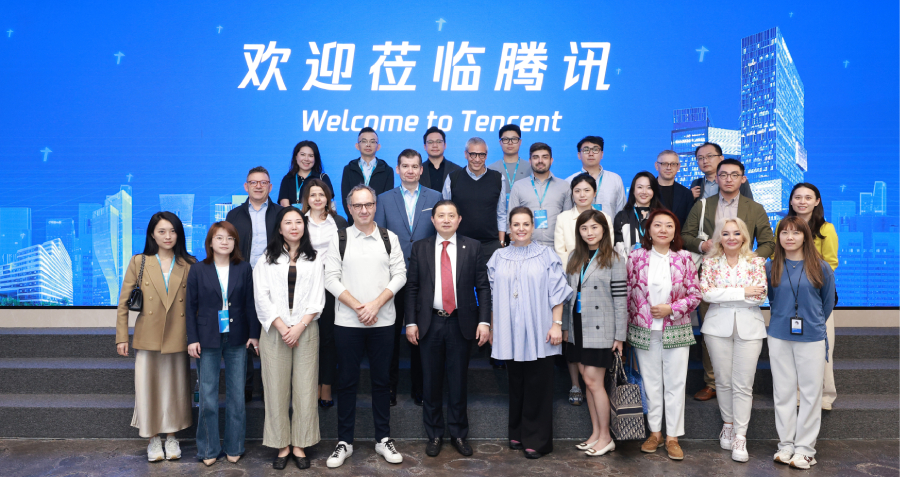The Asia Start program is crucial because it provides startups and scaling businesses across the world with strategic insights, networks, and resources to navigate the rapidly evolving digital economy. Given China’s profound impact on digital transformation, the program helps companies leverage Chinese expertise in e-commerce, fintech, AI and EVs. It also fosters cross-border collaboration, investment opportunities, and knowledge-sharing to accelerate growth and competitiveness in the region.
Asia Start in Context
Looking at the digital economy across Southeast Asia you can see the fingerprints of Chinese influence in almost any sector, from e-commerce to fintech to food delivery. Over the past decade, China’s tech giants have been honing their craft in the highly competitive domestic market and are now helping promote similar innovation overseas.
Southeast Asia’s digital economy is projected to reach a value of $600 billion in gross-merchandise volume (GMV) by 2030 and for companies looking to scale and innovate across the continent, there is much to learn from the business strategies of Chinese firms.
“China has played a transformational role in Southeast Asia’s digitalization over the last decade,” says Bo Ji, Assistant Dean of Global Executive Education & Chief Representative for Europe. “This has been done through investment in startups and the tech ecosystem, as well as infrastructure development. And many of the successes China has had in the digital economy have been relevant to Southeast Asia.”
Getting a start in Southeast Asia
Southeast Asia’s digital economy has been growing at a rapid rate over the last decade, and in 2023, according to the e-Conomy SEA 2023 report, produced by Bain, Temasek and Goodle, the region reached the key milestone of $100 billion in revenue across all digital economy sectors, an eight-fold increase on 2016.
Many of the firms working in the sectors are either startups up or new subsidiaries, and between 2022 and 2024 profitability grew 2.5 times to $11 billion total profits across the region. This profitability spans the whole gamut of digital economy sectors, including e-commerce, social commerce, food delivery, transport, online travel and media and digital financial services (fintech).
According to the Bain analysis, Indonesia’s digital economy is the region’s largest, with a projected GMV of $109 billion in 2025, followed by $49 billion for Thailand and $43 billion for Vietnam. Malaysia, Singapore and the Philippines are not far behind, and all are expected to grow at a CAGR of between 13-20% over the coming years.
Investment and acquisitions by China’s leading tech firms in Southeast Asian companies has been a key driver in this growth, but we are now seeing the regions own startups, many still at least partially backed by companies such as Tencent, Alibaba and ByteDance, develop into market leaders.
“The Chinese companies went to Southeast Asia as pioneers of the technologies and services,” says Ji. “But the result has been that local startups and technology companies have picked up in a big way and their growth has been rapid.”

China’s digital economy innovation
China’s is a market that drives digital innovation, with fierce competition promoting efficiency, innovation and disruption. This applies to SMEs attempting to find growth in the market, or the large, disruptive business models of China, and Asia’s top tech and manufacturing companies who wish to stay at the forefront of innovation.
For China’s larger companies, the ecosystem is full of competition and this requires the country’s tech giants such as Alibaba, Tencent and ByteDance to continuously disrupt the market to remain competitive.
There are several key reasons for China’s success in the digital economy, the first of which is its massive consumer base. There are over 1 billion internet users in the country, creating a huge demand for new digital services, and this, combined with a lack of market penetration for many of the traditional services found in Western economies, means opportunity.
“Banking is a great example,” says Ji. “The sophisticated offline financial infrastructure you can find in the US or UK was not established in China, and as a result the country has leapfrogged from cash directly to widespread fintech services.”
The policy push to advance industries deemed strategically important has also been a driving force. China’s 14th five-year plan (FYP) on Digital Economy Development provided a detailed roadmap for the enhancement of capabilities in areas such as communications, integrated circuits and blockchain, as well as pushing for technologies such as 6G and increasing the digitalization of the country’s supply chains.
The result has been digitally innovative products and business models in China, including super-apps, fintech, social commerce and live-streaming e-commerce, AI-driven retail and logistics and cloud infrastructure. And, in each of these cases, China’s major firms have played a role in exporting these innovations across Southeast Asia.
“This robust economic relationship is now being further strengthened by our shared resolve to drive the wave of digital transformation, unlocking new opportunities for innovation, connectivity, and sustainable growth,” said ASEAN Secretary-General Kao Kim Hourn in a statement earlier this year.
China’s presence in Southeast Asia’s digital economy
We are now seeing a large amount of technology and knowledge transfer between China and Southeast Asia, stemming primarily from large investments by Chinese firms in the region. In early 2024, TikTok paid around $820 million for a 75% share of Indonesian e-commerce platform Tokopedia. Alibaba also invested $845 million in Singapore-based online retailer Lazada, and Tencent have backed Sea Group, a Singaporean firm that owns game developer Garena, e-commerce firm Shopee and fintech firm SeaMoney.
As a result, there is now a reflection of business strategies pioneered in China across Southeast Asia’s digital economy. For example, social commerce—the use of social networks in the context of e-commerce transactions— which was introduced by group-buying platform Pinduoduo in China can now be seen in Shopee and TikTok Shop.
In a similar vein, both Shopee Live and TikTok Shop also offer live streaming e-commerce, which has been growing in popularity in China over the past decade, with the platforms leveraging Key Opinion Leaders (KOLs), or influencers, and real-time sales to drive conversions.
There is also a requirement for increased logistics capacity to underpin the growth in e-commerce. Alibaba’s logistics arm Cainiao has increasingly been integrating AI into its processes to improve fulfillment and last-mile delivery solutions, and now companies such as Ninja Van and J&T Express are pursuing the same goals in Southeast Asia.
Super apps akin to WeChat or Alipay have also begun to evolve across the continent, with apps such as Grab and Gojek offering a wide range of services such as ride-hailing, food delivery and financial services. Gojek alone has had over 170 million downloads across the region.
“China has a lot of experience and years of development in these areas, and that is becoming increasingly relevant to Southeast Asia,” says Ji. “Sharing that knowledge can really boost the development of the region.”

How has it happened?
While there is a clear desire from domestic entrepreneurs to develop the digital economy independently across Southeast Asia, China’s influence on digitalization and innovation is clear and there are several reasons why the area has been a target for Chinese firms’ expansion.
Southeast Asia has, over the past decade, seen a rapid expansion of digital penetration, with urban areas in Malaysia, Thailand and Indonesia reaching a penetration rate of 97%, 92% and 89% in 2022, close to saturation. With this comes a growth in demand for e-commerce, fintech and digital services as a whole. As a result, we have seen companies such as Alibaba, Tencent and ByteDance invest heavily in startups and the tech ecosystem as a whole.
There is also strong government support for digital transformation in Southeast Asia. “The central government in Beijing plays a supportive role by providing inter-governmental frameworks on various aspects of digital economy cooperation, especially through ASEAN-China mechanisms,” says Wang Zheng, Associate Fellow with the ISEAS – Yusof Ishak Institute in a 2024 commentary on the subject.
Another key pillar of Chinese support for this digital innovation is the infrastructural development that allows for the AI-drive and data-powered business models across Southeast Asia. One example was the announcement at the 2021 Alibaba Cloud Summit of the company’s AsiaForward Initiative designed to upskill local developers, small-to-medium-sized companies and connect businesses with venture capital. Alibaba said it would set aside $1 billon over the next three years to develop digital skills in the region, with the aim of helping to develop 100,000 developers and to help grow 100,000 tech startups.
On the digital manufacturing side, last year, Huawei, in conjunction with AIS, China Unicom and Midea, announced the implementation of the first fully 5G factory in Southeast Asia. The Midea Industrial Park in Chonburi along with a 5G+ industrial Internet platform, connects each production phase of operations to enable faster operation, and the company has announced plans to roll this out further.
As a result of these factors, there is now a well-established ecosystem of domestic businesses across the region. Shopee, Tokopedia and Lazada are all competing effectively with global giants in the e-commerce space. Grab Financial, SeaMoney and MoMo are innovating in the digital payments and lending space. When it comes to ride-hailing and logistics, Grab, Gojek and J&T Express are transforming mobility and last-mile logistics. And Ruangguru, Haladoc and MyDoc are addressing gaps in education and healthcare.
Future challenges for China and Southeast Asia
Despite the successes, it has not all been plain sailing for Chinese companies in Southeast Asia, with several challenges posing barriers to their growth. As with all cross-border business, regulatory differences between countries can often prove difficult to overcome, especially given the growing global concerns over data privacy and cybersecurity, and China’s own stringent cross-border data transfer regulations.
Additionally, although there is greater cultural similarity between China and countries across Southeast Asia when compared to Western economies, there are still differences, particularly when it comes to consumer needs and behavior. Companies have had to localize efficiently in order to avoid the repetition of failures such as eBay’s foray into the China market in 2002.
Lastly, there have been growing competitive pressures from local and international players. In cloud services, for example, in 2024 Amazon announced another $9 billion of investment into Singapore, and a plan to open a new cloud region in Thailand with an investment of $5 billion over 15 years. At the same time, Microsoft announced it will invest $2.2 billion over the next four years in Malaysia to boost its cloud and AI-led services.
There are also challenges for the the future of SEA’s digital development as a whole, particularly if companies want to work across borders rather than just staying in their domestic markets.
“Different regulations and languages mean that markets are often fragmented and this will take work to align,” says Ji. “Additionally, the infrastructure in some regions, particularly when it comes to payments, can be underdeveloped, causing difficulties with integration and service provision. Another key issue is a lack of access to advanced AI and deep-tech talent across the region.”
Continued innovation
China’s market is one of fierce competition and this has driven innovation in products and business models that can now be seen across Southeast Asia’s digital economy. But, as always with innovation, there is more to come.
“We’re going to see a lot more developments across Southeast Asia in the coming years,” says Ji. “AI-driven personalization of products and services, ecosystem-based platforms such as super apps, green tech development and supply chain innovations are all going to continue across the region, and that
is an exciting opportunity for new businesses and entrepreneurs.”
Pop-out box
Lessons to learn
Looking at both China’s digital innovation at home and its successful application across Southeast Asian markets, there are five key takeaways for businesses looking to learn and scale within their home markets:
- Speed and agility: With rapidly iterating data-driven decision-making proving key to the successful growth of companies, speed and agility are crucial to growth
- Ecosystem thinking: Building interconnected services, similar to China’s super apps, can provide new growth avenues and users experiences for consumers
- AI and automation: In today’s increasingly digital world, it is important to leverage AI to optimize business elements such as logistics, customer engagement and predictive analytics
- Consumer-centric approach: Companies should make their offerings more personal and rewarding through adopting social commerce, influencer-driven marketing and gamification within their business strategies
- Localization: Tailoring innovations to local cultures and regulations will aid in sustainable scaling of business operations
The importance of Asia Start
CKGSB’s Asia Start program provides crucial insights into the developing digital economy, allowing companies to get ahead of the changes that might pose challenges to their business.
According to previous Asia Start attendee Aleksandra Wolska, Vice President of Sustainability and ESG at LSP Group “There are so many changes and disruptions in the world today, and I have to ensure that our business is future-proof and our employees are safe. The Asia Start program from CKGSB helped our management team grow and develop in order for us to meet these goals.”
The detailed knowledge and expertise of the faculty provide a fast-paced and precise look at the China market as well as those around Asia. “I do not see many better ways to extract Information and the feeling of Asian markets in a single week than we did during the Asia Start program,” says Miguel Martins Da Silva, Chair Director at Dr Max Pharmacy Chain Penta Investments. “The extremely professional and experienced professors are not only academic but you can feel their business acumen, showing you how things work in practice.”

Combining this with visits to and practical experiences within the Chinese businesses that are driving the digital economy forwards helps attendees gain a greater grasp of business issues and the routes to quality solutions.
“What I enjoyed the most is the combination of both having some lectures to provide scenarios for us to think about, and then following that up with real life examples during visits to companies,” says Monika Jakubzyk, Partner in the Audit Department of KPMG in Central Europe. “There is an excellent balance. And in addition to that we also have the opportunity to meet representatives of the respective companies in more informal settings, which adds another layer of value to the program.”
As well as the specific business knowledge benefits, this also provides opportunities to develop cultural understanding and experience that can help companies and individuals work better across borders, as well as open eyes to new opportunities in digital development.
“We have been buying fabrics from China for many years, but I haven’t been there for a long time,” says Jaime Zuluaga, Co-founder of Fashion and Textile firm Línea Directa S.A.S. “Through Asia Start I had the opportunity to talk to a lot of colleagues and a lot of Chinese students, as well as visit some companies and it all really impressed me. I now better understand my suppliers and know how we can work together better in future. It also really opened my eyes to the opportunities presented by AI.”
The next Asia Start program, Asia Start: AI+Digital China Expedition, will be a 5-day immersive program providing a field learning journey across Shanghai, Hangzhou, Guangzhou and Shenzhen from 17-21 November 2025. Offering a new perspective on scaling your business by focusing on AI, digital innovation, Asia’s economic disruption model and market opportunities in Asia. Find out more about the program HERE.




















